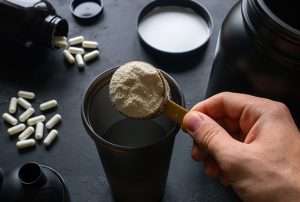Can I consume Plant Protein if I have IBS/ Lactose Intolerance?
What is IBS/ Lactose Intolerance?
IBS is a common digestive condition that causes severe stomach pain, diarrhoea, constipation, gas and bloating. Certain foods commonly trigger IBS symptoms, such as milk, chocolate, fruits, and vegetables. IBS is a chronic condition that has no cure but most people’s symptoms can be managed through diet, medication and lifestyle changes.
Lactose intolerance is a digestive disorder caused by the inability to digest lactose, the main carbohydrate in dairy products. It can cause various symptoms, including bloating, diarrhoea and abdominal cramps. People with lactose intolerance don’t make enough of the enzyme lactase, which is needed to digest lactose
Can I Consume Plant Protein for IBS/Lactose Intolerance?
Yes, you can consume plant-based proteins which have a low food map. You might think that pea is high on the food map, so it might not be the best idea to consume it. This is because the protein powder for IBS is made from pea it is isolated and the carbohydrate part of the pea is removed. Hence plant-based protein powder derived from pea proteins can be consumed if you suffer from IBS.
One needs to make sure the carbohydrate content is low in the protein and there is no sugar added in the product. Do read the ingredient label to make sure all the items mentioned are low in the food map.
Plant protein powder for IBS do not contain lactose and hence if you are lactose intolerant you can yet consume plant-based proteins without any problems.

Whey Protein for IBS/Lactose Intolerance
If you have been diagnosed with irritable bowel syndrome or your lactose intolerant, you may not be able to take whey protein powder. Whey protein powder is made from cow’s milk. Whey is one of the two primary proteins found in dairy. Dairy products are the common food that can trigger IBS symptoms. If you notice that your symptoms worsen after ingesting whey protein powder, discontinue use and talk with your doctor.
Common protein powder ingredients to avoid
There are so many protein powders on the market shelves, that it can take a lot of time to read labels and figure out if they are low FODMAP friendly or not. To make it simpler, follow these steps to find a FODMAP-friendly protein powder.
1. No whey concentrate
Avoid those protein powders that contain whey protein concentrate since this type of whey protein is fairly high in FODMAPs. Also, the hydrolyzed whey protein should be avoided when choosing protein powder products. That is not to say that all whey protein should be avoided though since whey protein isolate is considered safe on the low FODMAP diet. This step should narrow your choices down quickly.
2. Watch for high FODMAP sweeteners
Next, look at the ingredient label for sweeteners. Avoid any protein powder that contains fructose, agave syrup, honey, sorghum syrup, molasses, or sugar alcohols. Sugar alcohols will include any ingredients like maltitol, xylitol, erythritol, or sorbitol. These ingredients are high FODMAP and may trigger digestive symptoms in those with IBS.
3. Look out for other high FODMAP additives
Here is a short list of some other protein powder ingredients that you should avoid:
-
- Carob powder (no more than 1 teaspoon)
- Malted chocolate-flavoured beverage base (no more than 1.5 heaped teaspoons)
- Ground cashews or pistachios
- Buttermilk powder
- Kefir powder
- Milk powder
- Inulin
- Casein
- Gluten
- Soybean powder or any bean or lentil powder
- Apple, pear, peach, or mango fruit concentrates
This is just a brief list that should get you started to choosing a safe protein powder. Now let’s look at what protein powder ingredients are good to go.
Also Read: Health Benefits of Matcha
Safe protein powder choices
Here is a list of ingredients in protein powder products that are safe for you to consume and some low FODMAP choices to try.
- Pea protein: safe in a two-tablespoon serving.
- Brown rice protein powder that is sprouted and organic: safe in a two-tablespoon serving.
Authors Recommendation
If your lactose intolerant or suffering from IBS I would recommend you to shift to Plix Plant Protein. Plix is a combination of pea protein and brown rice protein which delivers a complete amino acid profile and is low on the food-map.
Plix is dairy-free, gluten-free and soy-free and is created from plant-based ingredients. Each serving of Plix has 25g of complete plant protein along with superfoods ( Lycopene and grape seed extract) The product has no added sugar and is flavoured using raw cocoa powder
You can buy our Plant-based protein powder from here:

















